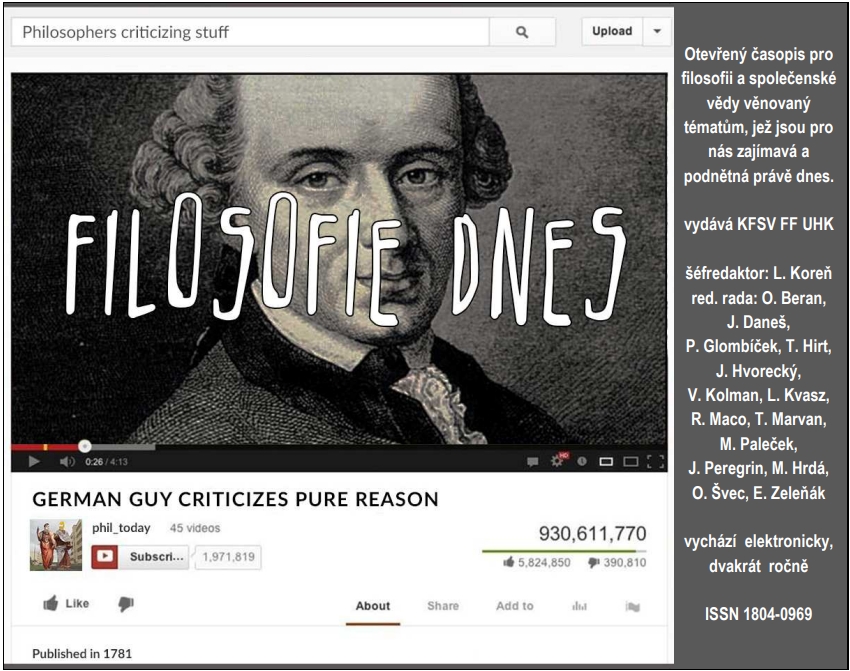Modus vivendi Johna Graye jako alternativní projekt liberálního myšlení: akceptace hodnotového konfliktu coby základu politična
DOI:
https://doi.org/10.26806/fd.v9i1.236Klíčová slova:
John Gray, Liberalismus, Modus vivendi, Hodnotový pluralismus, Tolerance, PolitičnoAbstrakt
Studie se zabývá analýzou politické teorie modu vivendi britského politického filosofa Johna Graye, přičemž za její hlavní cíl lze považovat především určení autorovy ideologické pozice v kontextu liberálního myšlení, jakož i posouzení koherence Grayovy teorie s koncepcí liberalismu strachu. Na základě kritické reflexe převažujícího univerzalistického pojetí liberalismu článek identifikuje a analyzuje stěžejní atributy Grayova specifického uchopení liberální teorie v podobě ideálu modu vivendi, etické teorie hodnotového pluralismu, univerzálního minima a hodnoty tolerance. V návaznosti na tuto identifikaci je následně zkoumán i etický rozměr Grayovy politické teorie, jehož charakteristika umožňuje zhodnotit, do jaké míry lze autorovu teorii interpretovat v kontextu liberálního myšlení. V této souvislosti se studie rovněž snaží ukotvit Grayovu tvorbu v širším rámci alternativních projektů liberální teorie, když usiluje o prokázání principiálních paralel mezi Grayovým politickým modelem a politickým myšlením Bernarda Williamse jakožto stěžejním představitelem tzv. liberalismu strachu. Výzkum těchto paralel pak přispívá především k nastolení otázek souvisejících s možností důsledného odlišování politické a morální teorie a chápání konfliktu jakožto neodmyslitelné součásti politické reality v rámci současného liberalismu.
The paper aims to analyse the political theory of modus vivendi by political philosopher John Gray and to determine the ideological standpoints of Gray's theory within the context of liberal thought as well as to assess its coherence with the concept of liberalism of fear. On the basis of a critical reflection of the prevailing universalistic conception of liberalism, the study identifies and analyses essential attributes of Gray's specific but controversial political theory: the ideal of modus vivendi; ethical theory of value pluralism; universal minimum and the value of toleration. Having interpreted all those main parts of the concept, the study is supposed to clarify also the ethical dimension of Gray's theory which makes it possible to decide to what extent the author might be identified as a liberal thinker. In this regard, the study endeavours to embed Gray's thought in a broader framework of alternative projects of liberal theory by demonstrating fundamental parallels between Gray's model and political thought of Bernard Williams as the main theoretician of liberalism of fear. Investigations of those parallels thus contributes towards articulating questions concerning the possibility of consistently distinguishing between the political and the moral theory as well as perception of a conflict as an ineradicable part of political reality in the framework of contemporary liberalism.
Stahování
Publikováno
Číslo
Sekce
Licence
Autoři, kteří publikují v tomto časopise, souhlasí s následujícími body:
- Autoři si ponechávají copyright a garantují časopisu právo prvního publikování, přitom je práce zároveň licencována pod Creative Commons Attribution licencí, která umožňuje ostatním sdílet tuto práci s tím, že přiznají jejího autora a první publikování v tomto časopisu.
- Autoři mohou vstupovat do dalších samostatných smluvních dohod pro neexkluzivní šíření práce ve verzi, ve které byla publikována v časopise (například publikovat ji v knize), avšak s tím, že přiznají její první publikování v tomto časopisu.
- Autorům je dovoleno a doporučováno, aby zpřístupnili svou práci online (například na svých webových stránkách) před a v průběhu redakčního řízení jejich příspěvku, protože takový postup může vést k produktivním výměnám názorů a také dřívější a vyšší citovanosti publikované práce (Viz Efekt otevřeného přístupu).


